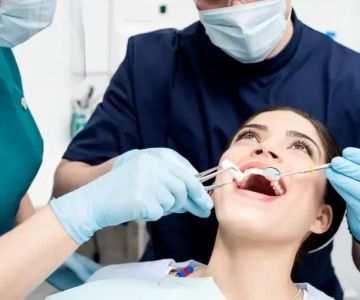Dental Injury Care: A Detailed Exploration
Dental trauma is any injury to the teeth, gums, jawbone, or soft tissues of the mouth. Accidents, such as falls, car wrecks, and sports-related incidents, are the main causes of these traumas. Early treatment is crucial for a full recovery. There are numerous types of dental injuries, including chipped, cracked, dislodged, or knocked-out teeth, as well as cuts and broken jaws. The symptoms of dental trauma can vary, ranging from toothache and discoloration to mouth pain, swelling, and bleeding. The causes of dental trauma are diverse, with falls, vehicle accidents, and sports activities being common culprits. Risk factors include playing contact sports, having an overjet, extensive tooth decay, piercings, and being under 20 years old.
Diagnosis and Tests
A dentist will conduct a thorough examination of your mouth and inquire about the cause of the injury and your symptoms. They may also order dental X-rays or a CT scan to assess the extent of the damage.
Management and Treatment
Dentists use a variety of procedures to treat dental trauma, depending on the type and severity of the injury. Common treatments include dental fillings and bonding for minor damages, root canal therapy if the pulp is affected, restabilization or replantation of dislodged or knocked-out teeth, tooth extraction for irreparable damage, and tooth replacement for lost teeth.
Prevention
You can reduce the risk of dental trauma by taking certain precautions. Wearing a protective mouth guard during contact sports, using seatbelts when driving, avoiding chewing on ice and using teeth as tools, and refraining from biting fingernails are all effective measures.
Outlook and Prognosis
The outcome of dental trauma varies for each individual and depends on the promptness of treatment. Minor traumas may heal quickly, while more severe ones, especially those affecting the tooth pulp, can take several months to recover fully.
Living With Dental Trauma
It's essential to contact your dentist immediately after a dental injury, even if you're not in pain. Severe bleeding, intense pain, or a broken jaw requires a visit to the emergency room. If you've experienced dental trauma, it's beneficial to ask your dentist questions about the severity of the injury, the required treatment, its duration, success rate, and the chances of saving the tooth.
Additional Common Questions
The most common dental traumas include tooth crown fractures, knocked-out teeth, and dislodged teeth. Mouth injuries are common, especially in children. They can involve various parts of the mouth and teeth. Minor mouth injuries can often be managed at home, but some require immediate dental or medical attention. For instance, a knocked-out permanent tooth needs urgent reimplantation, and dental care is necessary promptly. Injuries can cause cracks, chips, dislocations, or color changes in teeth. Mouth or lip injuries may require stitches, and deeper tissue injuries in the mouth can be serious.
In conclusion, dental injury care is of utmost importance. Whether it's a minor chip or a severe trauma, prompt and appropriate treatment can make a significant difference in recovery and long-term oral health. Understanding the causes, symptoms, and available treatments empowers you to take the right steps for optimal outcomes.




 Westgate Dental Arts
Westgate Dental Arts Coventry Family Dental
Coventry Family Dental Familia Dental
Familia Dental Dr. Daniel S. Fife, DDS
Dr. Daniel S. Fife, DDS Dentistry At Suburban Square: Michael I. Wollock, DMD
Dentistry At Suburban Square: Michael I. Wollock, DMD Comfort Care Dental
Comfort Care Dental The Importance of Oral Health Education During Pregnancy for a Healthy Pregnancy
The Importance of Oral Health Education During Pregnancy for a Healthy Pregnancy Why Skipping Dental Checkups Can Lead to Bigger Oral Health Problems
Why Skipping Dental Checkups Can Lead to Bigger Oral Health Problems Advantages of Porcelain Dental Restorations
Advantages of Porcelain Dental Restorations Best Tips for Brushing Your Teeth Properly for Healthy Gums: Essential Techniques for Oral Health
Best Tips for Brushing Your Teeth Properly for Healthy Gums: Essential Techniques for Oral Health How Can Diabetes Cause Tooth and Gum Problems? Preventing and Managing Oral Health Issues
How Can Diabetes Cause Tooth and Gum Problems? Preventing and Managing Oral Health Issues Healthy Habits for Promoting Good Oral Health and Hygiene: Tips for a Healthy Smile
Healthy Habits for Promoting Good Oral Health and Hygiene: Tips for a Healthy Smile